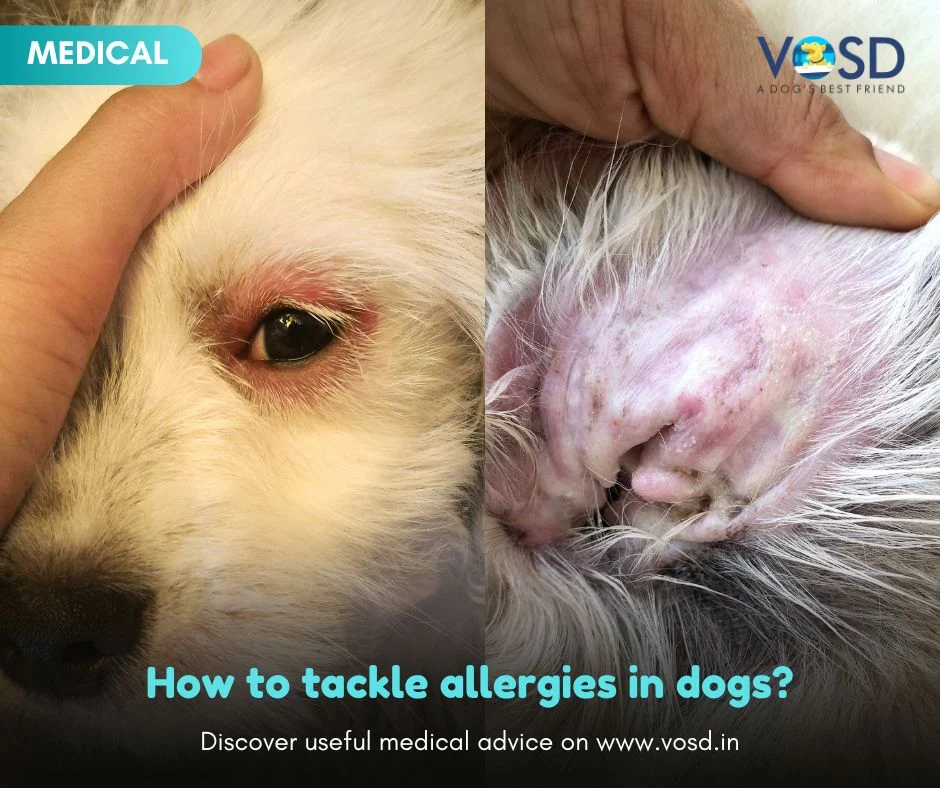Common allergens that cause dogs to show symptoms such as itching, sneezing and diarrhoea are found all over the environment. These allergies can cause much discomfort and unrest to our dog friends. There are many ways in which we can help them overcome the physical ramifications of these allergies. This post details causes of allergies, food that can cause allergies in dogs, and the best line of treatment (and home remedies that can be used) in such cases.
It would be helpful to learn about the major symptoms of allergies in dogs.
Symptoms of allergies in dogs:
1. Constant licking of the affected area
2. Regular wheezing and sneezing
3. Compulsive scratching and biting of a particular body part
4. Loss of fur
5. Constantly rubbing the body against furniture, ground or other surfaces
6. Irritation of the ear
Causes of allergies in dogs:
Allergies in dogs can be caused by a variety of factors, including:
Environmental allergens such as pollen, mold, dust mites, and grass.
Food allergens such as beef, dairy, wheat, and soy. Flea and tick bites;
certain medications; bacterial or yeast infections; certain underlying medical conditions such as atopy (inherited tendency to develop allergies) or hypothyroidism.
Symptoms of allergies in dogs can include itching, scratching, biting or licking of the skin, red or irritated skin, and hair loss.
Foods that can cause allergies in dogs
There are several common food ingredients that can cause allergies in dogs, including:
1. Beef: Some dogs may be allergic to beef and other meats, such as chicken and lamb.
2. Dairy: Some dogs may be lactose intolerant and unable to digest milk and other dairy products.
3. Grain: Some dogs may be allergic to grains such as wheat, corn, and soy.
4. Eggs: Some dogs may be allergic to eggs and their proteins.
5. Fish: Although some fish can be beneficial for dogs with allergies, other types of fish can cause allergic reactions.
It is important to note that any ingredient can cause an allergic reaction in dogs and these are just the most common. Dogs can also develop allergies to preservatives, chemicals, and other substances in commercial dog foods.
Best allergy medicines for dogs
There are several types of medications that can be used to treat allergies in dogs, and the best option for your dog will depend on the specific cause of their allergies and the severity of their symptoms. Some common types of medications used to treat allergies in dogs include:
1. Antihistamines: These can help to relieve itching and other symptoms associated with allergies.
2. Steroids: These can help to reduce inflammation and itching associated with allergies, but they should not be used long-term.
3. Immunomodulators: These can help to suppress the immune system and reduce the severity of allergic reactions.
4. Essential fatty acids: These can help to reduce itching, inflammation and also will help to maintain healthy skin
5. Shampoo, sprays, and rinses: These topical products can help soothe irritated skin and reduce itching.
Foods that can heal allergies in dogs
There are certain foods that may help alleviate allergy symptoms in dogs, such as fish and sweet potatoes. Fish, such as salmon and sardines, contain omega-3 fatty acids which can help reduce inflammation in the body. Sweet potatoes are a good source of vitamin A, which can also help reduce inflammation. Additionally, a hypoallergenic diet made with novel protein sources, such as duck or venison, may also be beneficial for dogs with food allergies. It is always best to consult with your veterinarian before making any changes to your dog’s diet, especially if they have a known allergy of some kind.
Dog breeds popular in India most prone to skin allergies
Some popular dog breeds in India that are known to be prone to skin allergies include:
1. Labrador Retriever: They are popular for their friendly and outgoing nature and are prone to skin allergies.
2. German Shepherd: They are known for their intelligence, trainability, and protective nature. They are also prone to skin allergies.
3. Golden Retriever: They are friendly and easy-going dogs, and also prone to skin allergies.
4. Indian Pariah Dog: They are considered to be the oldest and most ancient breed of dog in India. They are also known to be prone to skin allergies.
5. Rottweiler: This breed is known for its strength, loyalty, and protective nature, they are also prone to developing skin allergies.
It’s important to note that any dog can develop skin allergies regardless of breed and that not all dogs from these breeds will develop skin allergies.
Early diagnosis of allergies helps alleviate the symptoms sooner and is also less expensive than delayed treatment. So, make an appointment with your vet as soon as your dog’s allergies become apparent and ensure your dog leads a quality life.
Disclaimer:
The information contained in VOSD Vet Advice™ is not intended nor implied to be a substitute for professional medical action which is provided by your vet. You assume full responsibility for how you choose to use this information. For any emergency situation related to a dog’s health, please visit the nearest veterinary clinic.
Do you find this information useful? For more medical advice, visit the VOSD website.










